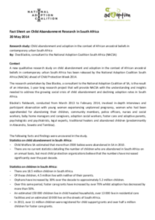This fact sheet summarizes a qualitative research study conducted by the National Adoption Coalition South Africa (NACSA) that explored child abandonment and adoption in the context of African ancestral beliefs in urban South Africa. The goal of this one-year study was to better understand the growing practice of child abandonment and declining adoption rates in South Africa. In-depth interviews were conducted with young women experiencing unplanned pregnancy, women who had been apprehended for abandoning their children, community members, police officers, nurses and social workers, baby home managers and caregivers, adoption social workers, foster care and adoptive parents, psychologists and psychiatrists, legal experts, traditional healers and abandoned children (predominantly in Alexandra, Soweto and Tembisa).
In 2010, 3500 babies were estimated to have been abandonned in South Africa, and experts believe the numbers have increased substantially since then. Over the past decade, foster care grants have increased by 70% while adoption has decreased by over 50% in South Africa. In South Africa, it is estimated that 150,000 children live in child-headed households, 13,000 in residential care facilities, and 10,000 on the streets.
The fact sheet discusses the Children's Act 38 of 2005, which governs child abandonment, and highlights some of its implementation problems, including: undocumented immigrants' inability to place their children in the child protection care system; the inability of a young woman under age 18 to legally relinquish her parental rights; and an increase in "baby safes" despite legal prohibition.

